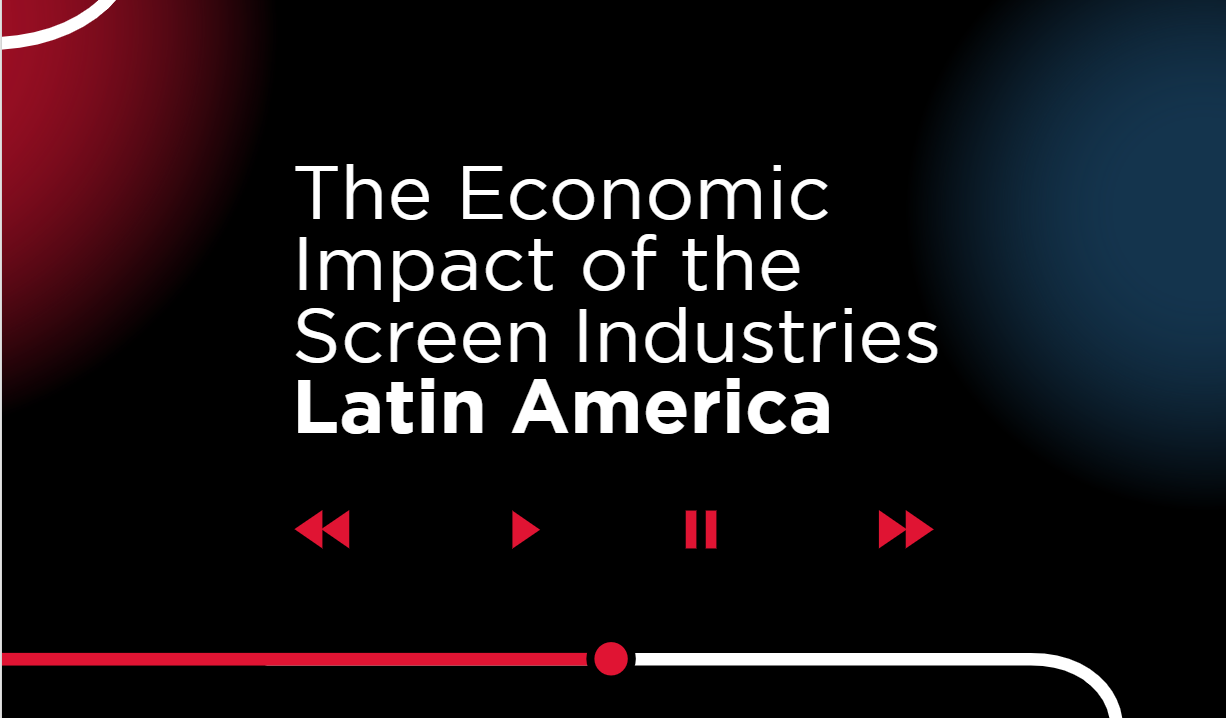Latin America has extensive and incomparable competitive advantages. Within just a few kilometres, you can find mountains with snow-capped peaks, deserts, rainforests, beaches, volcanoes and ancient cities, as well as countless stories that reflect our region’s cultural diversity.
By telling the stories and history of Latin America through content, the screen industries, which includes TV and film making, are not only a key source of entertainment and cultural representation, but also a driver of economic growth in the region. While the cultural and social importance of the screen industries is widely recognised, the wider economic impact is often less well understood.
TV and film making play an important role in generating economic benefits as large amounts of spending in the audiovisual sector impact several other industries. Behind the cameras of your favourite TV shows and films, there are chefs preparing traditional food, fashion designers crafting beautiful costumes and scenographers creating stage environments and atmospheres to amaze audiences, amongst many others.
In fact, across Argentina, Brazil, Colombia and Mexico, over two-thirds of total expenditure occurs in other sectors within the supply chain, such as professional services, construction, textile and advertising.
Findings in a recently released report commissioned by Netflix in consultation with the IDB, show how multipliers calculated for Argentina, Brazil, Colombia and Mexico can be used by policymakers and industry stakeholders to quantify the total economic contribution (i.e., the direct, indirect and induced impacts) of spending in the screen industries.
Argentina, Brazil and Mexico have the largest screen industries in Latin America, generating a sector revenue of approximately US$20bn in 2021 across these three countries, of which US$3bn came from film making. In recent years there has been growth in Latin American countries with emerging screen industries, such as Colombia. Between 2009 and 2019, Colombia’s screen industries revenue increased by 15% and reached US$2.3bn in 2021. This has important implications for employment as well. Across these markets, for every 100 people employed directly in the industry an additional 50-70 people are employed across the economy.
Key highlights per country
Mexico:
- For every 200 million MXN directly invested in the AV industry, an additional 127 million MXN is generated indirectly in the supply chain.
- For every 100 people employed, an additional 66 people are employed across the economy.
Argentina:
- For every 10 million ARS directly invested in the AV industry, an additional 19 million ARS is generated indirectly in the supply chain.
- For every 100 people employed, an additional 73 people are employed across the economy.
Brazil
- For every 10 million BRL directly invested in the AV industry, an additional 29 million BRL is generated indirectly in the supply chain.
- For every 100 people employed, an additional 54 people are employed across the economy.
Colombia:
- For every 100 million COP directly invested in the AV industry, an additional 170 million COP is generated indirectly in the supply chain.
- For every 100 people employed, an additional 50 people are employed across the economy
Looking ahead
Spillover effects to other industries can have a significant further economic impact. Additional economic benefits from producing and viewing content can be generated from unique spillover effects, such as increased tourism to filming locations, increased book sales, re-releases of out-of-print books and increased music streams and downloads.
Now more than ever, we must create a transformative strategy which establishes better local and international cooperation, provides better access to funding with an understanding of local conditions for productions, a cutting-edge infrastructure, regulations that support the industry’s growth, and an educational model that invests in human capital to fill existing gaps.
Experience has shown us that legislation that stimulates the film and TV industry is one important factor. But it’s not the only one, and governments in the region have the opportunity to benefit from the potential economic impact in other ways. This report is a meaningful step. It will serve to support the film and TV sector and permit the creation of agile public policy that aims to generate economic growth and new jobs, while addressing local challenges and targeting highly trained, prestigious professionals.
Download the complete publication here to read more key findings and recommendations.



Leave a Reply